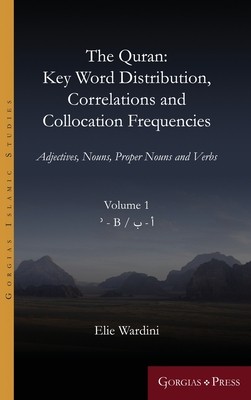
- We will send in 10–14 business days.
- Author: Elie Wardini
- Publisher: Gorgias Press
- Year: 2022
- Pages: 516
- ISBN-10: 1463244142
- ISBN-13: 9781463244149
- Format: 15.2 x 22.9 x 2.9 cm, hardcover
- Language: Arabų, English
- SAVE -10% with code: EXTRA
The Quran. Key Word Distribution, Correlations and Collocation Frequencies. Volume 1 of 5 (e-book) (used book) | bookbook.eu
Reviews
Description
The aim with the present series, The Quran: Key Word Distribution, Correlations and Collocation Frequencies, is to present key data related to the lexicon of the Quran, in terms of Key Word distribution and lexical associations. The digital text used for this purpose is the Uthmani text of the Tanzil Quran Text. This text is widely used. All vocalized Arabic text is quoted unaltered in any shape or form from the Tanzil text. Unvocalized Arabic text and transcriptions are my own. In this series, each Key Word, here adjectives, nouns, proper nouns and verbs, is presented together with the following key data: Degree of Concentration, Weighted Distribution, Correlations and Collocation Frequencies. The Key Words are always referenced by their lemma and are sorted alphabetically according to Arabic and UNICODE order. In lemmatizing the words, no attention has been given to the semantics of each word. Only on rare occasion have similar forms of words or proper nouns been separated in order to avoid confusion. In assigning each word a lemma, Classical dictionaries and Quran commentaries, as well as modern Quran dictionaries have been consulted. Deciding on these is not always obvious, since classical dictionaries and commentaries sometimes either disagree or present divergent variant readings or root and lemma attributions. It is our hope and aim that this series contributes to Computational Linguistics and Digital Humanities in general, and Computational Linguistics research on the Quran in particular.
EXTRA 10 % discount with code: EXTRA
The promotion ends in 19d.05:54:41
The discount code is valid when purchasing from 10 €. Discounts do not stack.
- Author: Elie Wardini
- Publisher: Gorgias Press
- Year: 2022
- Pages: 516
- ISBN-10: 1463244142
- ISBN-13: 9781463244149
- Format: 15.2 x 22.9 x 2.9 cm, hardcover
- Language: Arabų, English Arabų, English
The aim with the present series, The Quran: Key Word Distribution, Correlations and Collocation Frequencies, is to present key data related to the lexicon of the Quran, in terms of Key Word distribution and lexical associations. The digital text used for this purpose is the Uthmani text of the Tanzil Quran Text. This text is widely used. All vocalized Arabic text is quoted unaltered in any shape or form from the Tanzil text. Unvocalized Arabic text and transcriptions are my own. In this series, each Key Word, here adjectives, nouns, proper nouns and verbs, is presented together with the following key data: Degree of Concentration, Weighted Distribution, Correlations and Collocation Frequencies. The Key Words are always referenced by their lemma and are sorted alphabetically according to Arabic and UNICODE order. In lemmatizing the words, no attention has been given to the semantics of each word. Only on rare occasion have similar forms of words or proper nouns been separated in order to avoid confusion. In assigning each word a lemma, Classical dictionaries and Quran commentaries, as well as modern Quran dictionaries have been consulted. Deciding on these is not always obvious, since classical dictionaries and commentaries sometimes either disagree or present divergent variant readings or root and lemma attributions. It is our hope and aim that this series contributes to Computational Linguistics and Digital Humanities in general, and Computational Linguistics research on the Quran in particular.


Reviews